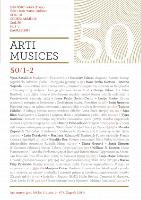
Arti Musices
Scope & Guideline
Innovating Dialogue in Music Research and Practice
Introduction
Aims and Scopes
- Historical Musicology:
Focuses on the historical development of music, including the evolution of music institutions and practices across different regions, particularly in Croatia and Central Europe. - Ethnomusicology:
Explores the intersection of music and culture, examining how music functions in various social contexts, including the impact of historical events on musical practices. - Music Pedagogy:
Investigates educational practices in music, including the influence of pedagogical theories on music education and the role of music in family and community settings. - Cultural Studies in Music:
Analyzes music as a cultural artifact, considering its role in identity formation, community engagement, and its interaction with broader social and political movements. - Interdisciplinary Approaches:
Incorporates perspectives from other disciplines such as literature, history, and sociology to enrich the understanding of music's role in society.
Trending and Emerging
- Impact of Political Events on Music:
An increasing number of articles examine how political and social upheavals, such as the war in Ukraine, influence music practices and perceptions, underscoring the connection between music and sociopolitical contexts. - Digital Humanities and Musicology:
There is a growing interest in the application of digital tools and methodologies in music research, reflecting a broader trend in academia towards digital humanities. - Gender and Music Studies:
Themes related to gender and sexuality in music are gaining traction, indicating a shift towards more inclusive and diverse explorations of musical practices and histories. - Cultural Memory and Heritage:
Explorations of cultural memory through music, including the preservation and reinterpretation of musical heritage, are increasingly prominent, highlighting the importance of music in collective memory. - Music and Migration:
Research focusing on the intersections of music, migration, and identity is emerging as a vital area of inquiry, reflecting contemporary global issues and their impact on musical practices.
Declining or Waning
- Traditional Music Forms:
There has been a noticeable decline in studies focused solely on traditional or folk music forms, as the journal increasingly embraces broader cultural analyses and contemporary issues. - Static Historical Narratives:
Research that presents static, uncritical views of historical music narratives is becoming less common, with a shift towards more dynamic and critical interpretations of music history. - Local Music Practices:
While local music practices were once a significant focus, the journal's recent publications indicate a trend towards more global and transnational perspectives, potentially sidelining localized studies.
Similar Journals

HUDEBNI VEDA
Championing Critical Discourse in MusicologyHUDEBNI VEDA is a distinguished journal published by the Czech Academy of Sciences Press, specializing in the field of music. With its ISSN 0018-7003 and E-ISSN 2694-6998, this journal serves as a vital platform for scholarly communication in music studies, promoting innovative research and critical discourse. Since its inception in 2002 and scheduled for continuation until 2024, it has emerged as a respected publication within the music academic community, though currently holding a Category Quartiles ranking of Q4 in Music. Notably, it ranks #127 out of 180 in the Scopus Arts and Humanities - Music category, placing it in the 29th percentile. While it operates under traditional access constraints, HUDEBNI VEDA is committed to fostering an inclusive academic environment, inviting contributions that push the boundaries of musicology. This journal is essential for researchers, professionals, and students eager to explore and engage with contemporary issues and developments in the study of music.

Musicologica Brunensia
Advancing Knowledge in the Art of SoundMusicologica Brunensia, an esteemed journal published by Masaryk University, Faculty of Arts, serves as a significant platform for the dissemination of knowledge in the field of musicology. Based in the Czech Republic, this Open Access journal has been facilitating scholarly communication since 2009, allowing unrestricted access to its rich array of research articles. With an ISSN of 1212-0391 and an E-ISSN of 2336-436X, Musicologica Brunensia proudly holds a Q3 ranking in the Music category as of 2023, reflecting its dedication to advancing research in the arts and humanities, particularly music. The journal accepts contributions spanning diverse topics within music studies, fostering interdisciplinary dialogue among researchers, professionals, and students alike. Located at Arne Novaka 1, Brno, 60200, Czech Republic, Musicologica Brunensia is poised to continue its journey of promoting innovative scholarship in musicology until 2024 and beyond, making it a valuable resource for anyone passionate about the field.

FOLK MUSIC JOURNAL
Illuminating the Cultural Echoes of Folk MusicFolk Music Journal, published by the English Folk Dance Song Society, is a prominent publication within the fields of Music and Visual Arts and Performing Arts. This journal, based in the United Kingdom at Cecil Sharp House, has been instrumental in advancing the study and appreciation of folk music, sharing invaluable research and insights from 2002 until its recent coverage concluded in 2020. Notably indexed with a Q3 rank in both the Music and Visual Arts categories for 2023, it stands as a significant resource for researchers, professionals, and students alike, contributing to a deeper understanding of folk music's cultural impact. Although it does not currently offer Open Access, the journal has fostered scholarly discourse, reflecting its vital role in the preservation and analysis of traditional musical forms.
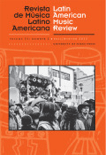
LATIN AMERICAN MUSIC REVIEW-REVISTA DE MUSICA LATINOAMERICANA
Innovating Research at the Intersection of Music and IdentityLATIN AMERICAN MUSIC REVIEW-REVISTA DE MUSICA LATINOAMERICANA stands as a prominent scholarly journal dedicated to the profound and diverse traditions of Latin American music. Published by University of Texas Press, this journal offers a platform for critical analysis, innovative research, and the dissemination of knowledge concerning the rich cultural heritage of Latin America. Although it currently does not provide open access options, the journal has made significant contributions to the field since its establishment, engaging a wide array of interdisciplinary perspectives. With coverage spanning from 2002 to 2009, the journal has been central to fostering scholarly dialogue and expanding the academic understanding of Latin American musicology, serving as an essential resource for researchers, professionals, and students alike. The journal is vital for those exploring the intersections of music, culture, and identity within the vibrant landscapes of Latin America.

Muzikoloski Zbornik
Championing Open Access in Music ScholarshipMuzikoloski Zbornik is a prominent open-access journal in the field of musicology, published by the esteemed University of Ljubljana Press since 1965. Hailing from Slovenia, this journal has been dedicated to advancing the study of musical heritage, theory, and practice, serving as a vital platform for researchers, professionals, and students alike. With a notable Q2 category ranking in the field of music and a Scopus ranking of 109 out of 180 in Arts and Humanities, Muzikoloski Zbornik showcases high-quality research, fostering discourse and collaboration among scholars globally. The journal embraces a diverse range of topics, from ethnomusicology to music education, ensuring its relevance in an ever-evolving academic landscape. By providing unrestricted access to its content, it champions the dissemination of knowledge and supports the growth of the musicology discipline.

Revista de Musicologia
Unveiling New Perspectives in Music ResearchRevista de Musicologia is a distinguished academic journal dedicated to the exploration and analysis of musicology, published by the SOC ESPANOLA MUSICOLOGIA. Based in Spain, this journal serves as a vital platform for music scholars, researchers, and enthusiasts to share innovative insights and original research concerning various aspects of music, including historical studies, ethnomusicology, and contemporary critiques. With its ISSN 0210-1459 and a current Scopus ranking placing it in the Q3 quartile of Music studies, the journal reflects a commitment to enhancing the discourse in this rich field. Although it currently does not publish under an open-access model, it continuously aims to provide a rigorous peer-reviewed environment for contributions that engage both academic inquiry and practical applications within musicology. The Revista de Musicologia is thus an essential resource for anyone in the field looking to expand their understanding and expertise in music studies from 2016 through 2024 and beyond.
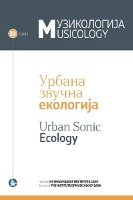
Muzikologija-Musicology
Fostering Open Access to Musicological InsightsMuzikologija-Musicology, published by the esteemed Serbian Academy of Sciences and Arts, Institute of Musicology (SASA), serves as a pivotal platform for scholarly discourse in the field of musicology. With its ISSN 1450-9814 and E-ISSN 2406-0976, this open-access journal has been committed to disseminating high-quality research since 2002, making significant contributions to the understanding and analysis of music in diverse cultural contexts. Located in Belgrade, Serbia, the journal proudly holds a Q2 ranking in the Music category for 2023, reflecting its high-impact contributions as evidenced by its Scopus rank of #136/180 and a percentile of 24th. Covering a wide array of topics within music, from ethnomusicology to music theory and history, it invites contributions that push the boundaries of music research. By fostering an open-access model, Muzikologija-Musicology aims to ensure that its findings are accessible to a global audience, thereby enriching the discourse and fostering collaboration in the musicology community.

FONTES ARTIS MUSICAE
Fostering collaboration and innovation in music research.FONTES ARTIS MUSICAE, with ISSN 0015-6191 and E-ISSN 2471-156X, is a distinguished journal published by A-R EDITIONS, specializing in the fields of Music and Library and Information Sciences. Established in the United States, this journal serves as a vital resource for scholars, practitioners, and students engaged in the exploration and analysis of music and its associated disciplines. With an established converged publication history from 2002 to 2024, FONTES ARTIS MUSICAE has consistently contributed to the discourse within its scope, reflected in its current quartile rankings of Q4 in Library and Information Sciences and Q3 in Music for 2023. Although not an open-access journal, it offers essential insights and research findings, appealing to a diverse academic audience. Its position within the 18th percentile of the Arts and Humanities (Music) category and 11th percentile in Library and Information Sciences underscores its growing significance in these fields, making it a critical platform for advancing knowledge and fostering collaboration.
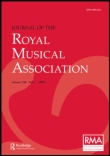
JOURNAL OF THE ROYAL MUSICAL ASSOCIATION
Illuminating the rich tapestry of musical history.JOURNAL OF THE ROYAL MUSICAL ASSOCIATION, published by Cambridge University Press, stands as a significant repository for innovative research and scholarly discourse within the field of music studies. Recognized for its contributions to the understanding of musical practices, theory, and history, this esteemed journal offers a platform for academics and researchers to disseminate their findings to a broad audience. With an ISSN of 0269-0403 and E-ISSN of 1471-6933, the journal has maintained a notable presence since its inception, merging insights from both traditional and contemporary musicology. It currently occupies a Q4 ranking in Music within the Scopus database, reflecting its inclusion within the arts and humanities landscape. While the journal traditionally operates under subscription access, its continuing commitment to advancing music scholarship ensures that it remains an essential resource for students, scholars, and practitioners alike, fostering greater understanding and appreciation of musical artistry from 1987 to the current era.
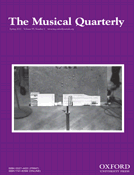
MUSICAL QUARTERLY
Fostering Insights in Music Theory and HistoryMUSICAL QUARTERLY, published by Oxford University Press Inc, is a distinguished journal in the field of music, with a publication history that stretches back to 1915. This esteemed journal, identifiable by its ISSN 0027-4631 and E-ISSN 1741-8399, provides a critical platform for scholarly discourse, analysis, and research in musicology and related disciplines, facilitating an understanding of both historical and contemporary musical practices. Although it operates without open access, it continues to attract a diverse readership of researchers, educators, and students alike, thanks to its well-curated articles and reviews that engage with music theory, history, and ethnomusicology. With a current Scopus rank of #119 out of 180 in the Arts and Humanities category and a 34th percentile ranking in Music, MUSICAL QUARTERLY plays a vital role in advancing knowledge and fostering collaboration within the music academic community. Its commitment to high-quality scholarship is reflected in its ongoing efforts to address the evolving landscape of music studies, making it an essential resource for anyone serious about exploring the rich tapestry of music scholarship.